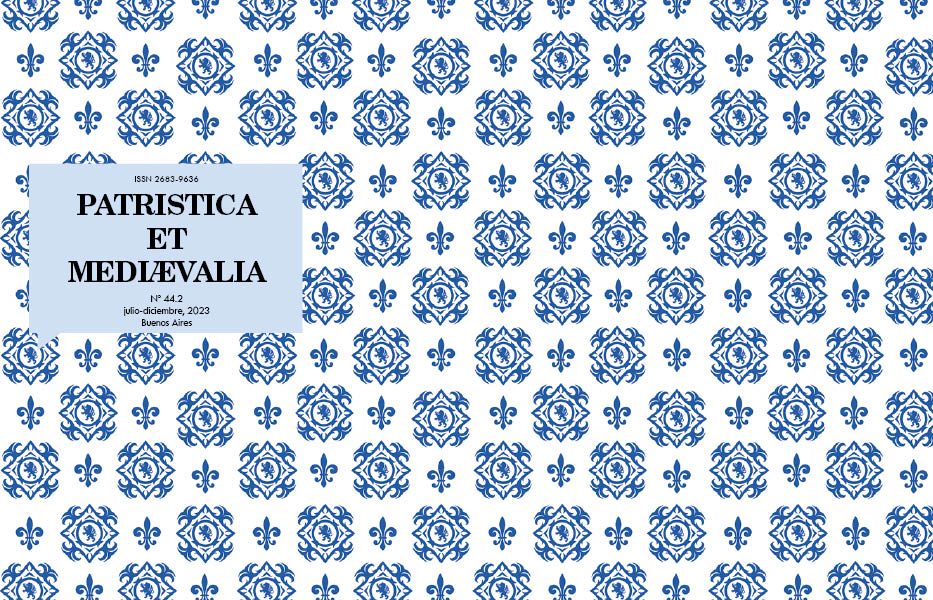The notion of res in Duns Scotus and the reason for rejecting the real distinction of essence and existence
Abstract
The distinction between essence and existence was held as one of the fundamental questions of metaphysics during scholasticism. Duns Scotus was emphatic in rejecting the thesis that the essence and the existence of a being are really distinct. In order to understand this rejection, in this article we analyze the notion of thing (res) in Scotus’ doctrine, especially in his criticism of Henry of Ghent concerning the ontological status of the creatable, taking into account the reception of the Avicenna’s doctrine of the primary notions. Scotus and Henry adopt different perspectives of the notion of res and reach divergent conclusions question of essence and existence in the context of the creation of the world. We also analyze Scotus’ argument regarding the nature of the simplicity found in creation, and how the Subtle Doctor argues for the rejection of a necessary real composition in the structure of created being and, consequently, rejects again a real distinction between essence and existence.Downloads
References
Avicenna Latinus (1977-1980). Liber de philosophia prima sive scientia divina. I-X. Ed. Van Riet, S., introd. Verbeke, G. Lovaina: Peeters.
Duns Scotus (1891-1895). Opera Omnia (Lyon, 1639), 26 vv. Ed. Vivès, L. Paris.
Duns Scotus (1950-). Opera Omnia. Ed. Commissionis Scotisticae. Types Polyglottis Vaticanis: Cidade do Vaticano.
Duns Scotus (1997). Quaestiones super libros Metaphysicorum Aristotelis, Libri I–IV (Opera Philosophica III). Ed. The Franciscan Institute: St. Bonaventure, Nova Iorque.
Henrici de Gandavo (1520). Summae quaestionum ordinariarum. Ed. Badius Ascensius: Paris. Repr. Buytaert, E. M. (1953). Ed. The Franciscan Institute: St. Bonaventure, Nova Iorque.
Thomas Aquinas (1976). De ente et essentia (Opera Omnia XLIII). Ed. Leonina: Roma.
Thomas Aquinas (1918-1930). Summa contra Gentiles (Opera Omnia XIII-XV). Ed. Leonina: Roma.
Thomas Aquinas (1888-1905). Summa Theologica (Opera Omnia IV-XII). Ed. Leonina: Roma.
Aristóteles (2014). Metafísica. Trad. Reale, G. e Perine, M. São Paulo: Ed. Loyola.
Avicenna (2005). The Metaphysics of the Healing. Trad. Marmura, M. Provo: Ed. Brigham Young University Press.
Aertsen, J. (2012). Medieval Philosophy as Transcendental Thought. Leiden: Brill.
Boulnois, O. (2015). Metafísicas Rebeldes: gênese e estruturas de uma ciência na Idade Média. Trad. Neves, P. São Leopoldo: Ed. UNISINOS.
Cross, R. (2013). “Duns Scotus on Essence and Existence”, Oxford Studies in Medieval Philosophy 1,173-204.
Guerrero-Troncoso (2021). “San Anselmo y los albores de la scientia transcendens. Una interpretación aviceniana de la regula Anselmi”, Anuario Filosófico 54.2, 235-263.
Hoffmann, T. (2011). “Henry of Ghent’s Influence on John Duns Scotus’s Metaphysics”. In: Wilson, G. A. (ed.). The Brill Companion to Henry of Ghent. Leiden: Brill.
Honnefelder, L. (2010). João Duns Scotus. Trad. Pich, R. São Paulo: Ed. Loyola.
Janssens, J. (2011). “Henry of Ghent and Avicenna”. In: Wilson, G. A. (ed.). The Brill Companion to Henry of Ghent. Leiden: Brill.
Knuuttila, S. (1981a). “Time and Modality in Scholasticism”. In: Idem (ed.). Reforging the great chain of being. Studies of the history of modal theories. Dordrecht - Boston - Londres: Springer,163-257.
Knuuttila, S. (1981b). “Duns Scotus’ Criticism of the ‘Statistical’ Interpretation of Modality”. In: Beckmann, J. P. et al. (eds.). Sprache und Erkenntnis im Mittelalter. Vol. 1, Berlim - Nova Iorque: De Gruyter 441-450. (Miscellanea mediaevalia 13.1).
Knuuttila, S. (2012). “Modality”. In: Marenbon, J. (ed.). The Oxford Handbook of Medieval Philosophy. Oxford: Oxford University Press, 312-341.
Porro, P. (2014). Tomás de Aquino – Um perfil histórico-filosófico. Trad. Soares Moreira, O. São Paulo: Ed. Loyola.
Ross, W. D. (1997). Aristotle’s Metaphysics. Vols. I e II. Oxford: Clarendon Press.
Vos, A. (2006). The Philosophy of John Duns Scotus, Edimburgo: Edinburgh University Press.
Wippel, J. (1982). “Essence and Existence”. In: Kretzmann, N. et al. (eds.). The Cambridge History of Later Medieval Philosophy: From the Rediscovery of Aristotle to the Disintegration of Scholasticism, 1100–1600. Cambridge: Cambridge University Press.
1. The authors who publish in this magazine accept the following conditions:
-
They retain the copyright and grant to the magazine the right of the first publication, with the work registered under the Attribution-ShareAlike 4.0 International License that allows third parties to use what is published as long as they mention the authorship of the work and the first publication in this magazine.
-
They can make other independent and additional contractual agreements for the non-exclusive distribution of the version of the article published in this magazine (eg. include it in an institutional repository or publish it in a book) provided that they clearly indicate that the work was first published in this journal.
-
They are allowed and recommended to publish their work on the Internet (for example on institutional or personal pages).
2. AutoArchive Conditions. Authors are allowed and encouraged to distribute post-print electronic versions of their manuscripts because it promotes their circulation, a possible increase of quotation and a major reach among the Academic community. Color RoMEO: blue.













